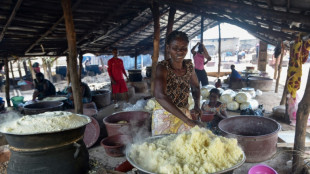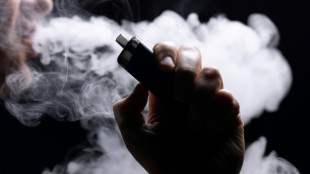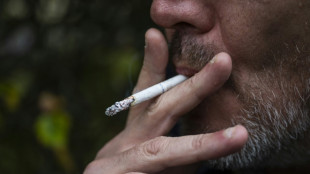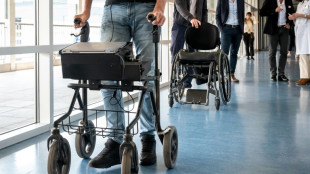
-
 South Korea president clings to power after martial law U-turn
South Korea president clings to power after martial law U-turn
-
Presidential vote seen as referendum on Romania's European future

-
 Hamilton bids farewell to Mercedes as Ferrari vie for title
Hamilton bids farewell to Mercedes as Ferrari vie for title
-
New Zealand unchanged in bid to hit back against England

-
 Macron seeks remedy to France's political crisis
Macron seeks remedy to France's political crisis
-
New Natalia Lafourcade album celebrates music's onstage evolutions

-
 Taiwan's Lai kicks off visit to US territory Guam
Taiwan's Lai kicks off visit to US territory Guam
-
Ivory Coast staple cassava meal gains UNESCO heritage status

-
 OpenAI to partner with military defense tech company
OpenAI to partner with military defense tech company
-
Liverpool held but Slot salutes 'special' Salah

-
 Man City needed to break losing 'routine', says Guardiola
Man City needed to break losing 'routine', says Guardiola
-
Leipzig down Frankfurt to reach German Cup quarters, Cologne strike late

-
 Mbappe admits penalty miss 'big mistake' as Bilbao beat Real Madrid
Mbappe admits penalty miss 'big mistake' as Bilbao beat Real Madrid
-
'Sad, disappointed' Mbappe pays penalty as Bilbao beat Real Madrid

-
 US stocks surge to records, shrugging off upheaval in South Korea, France
US stocks surge to records, shrugging off upheaval in South Korea, France
-
Liverpool held in Newcastle thriller, Arsenal inflict Amorim's first defeat

-
 Shiffrin confirms she'll miss Beaver Creek World Cup races
Shiffrin confirms she'll miss Beaver Creek World Cup races
-
Corner kings Arsenal beat Man Utd to close gap on Liverpool

-
 Mbappe pays penalty as Bilbao beat Real Madrid
Mbappe pays penalty as Bilbao beat Real Madrid
-
NFL Jaguars place Lawrence on injured reserve with concussion

-
 North Korea, Russia defence treaty comes into force
North Korea, Russia defence treaty comes into force
-
Openda hits brace as Leipzig beat Frankfurt in German Cup last 16

-
 Schar punishes Kelleher blunder as Newcastle hold Liverpool in thriller
Schar punishes Kelleher blunder as Newcastle hold Liverpool in thriller
-
De Bruyne masterclass helps Man City end seven-game winless streak

-
 Syrian rebels surround Hama 'from three sides', monitor says
Syrian rebels surround Hama 'from three sides', monitor says
-
Lawyers seek leniency for France rape trial defendants, blaming 'wolf' husband

-
 OpenAI chief 'believes' Musk will not abuse government power
OpenAI chief 'believes' Musk will not abuse government power
-
Thousands rally in Georgia after police raid opposition offices

-
 S. Korea opposition push to impeach president
S. Korea opposition push to impeach president
-
Powell 'not concerned' US Fed would lose independence under Trump

-
 French government falls in historic no-confidence vote
French government falls in historic no-confidence vote
-
Syrian White Helmets chief 'dreams' of never pulling a body out of rubble again

-
 NBA Suns lose Durant for at least a week with ankle injury
NBA Suns lose Durant for at least a week with ankle injury
-
Warhammer maker Games Workshop enters London's top stocks index

-
 Iran Nobel winner released for three weeks, 'unconditional' freedom urged
Iran Nobel winner released for three weeks, 'unconditional' freedom urged
-
Red Cross marks record numbers of humanitarians killed in 2024

-
 Johnson's Grand Slam 'no threat', says World Athletics boss Coe
Johnson's Grand Slam 'no threat', says World Athletics boss Coe
-
Qatar's emir and UK's Starmer talk trade as state visit ends

-
 Cuba suffers third nationwide blackout in two months
Cuba suffers third nationwide blackout in two months
-
Russia, Ukraine to send top diplomats to OSCE summit in Malta

-
 Spanish royals to attend memorial service for flood victims
Spanish royals to attend memorial service for flood victims
-
LPGA, USGA new policy requires female at birth or pre-puberty change

-
 Stick to current climate change laws, US tells top UN court
Stick to current climate change laws, US tells top UN court
-
British Museum chief says Marbles deal with Greece 'some distance' away

-
 Pope Francis receives electric popemobile from Mercedes
Pope Francis receives electric popemobile from Mercedes
-
Gaza civil defence: thousands flee Israeli strikes, evacuation calls

-
 Trump names billionaire private astronaut as next NASA chief
Trump names billionaire private astronaut as next NASA chief
-
Pidcock to leave INEOS Grenadiers at end of season

-
 Seoul stocks weaken, Paris advances despite political turmoil
Seoul stocks weaken, Paris advances despite political turmoil
-
South America summit hopes to seal 'historic' trade deal with EU


Swiss vote to boost renewable energy: polling institute
Switzerland was on Sunday on course to approve a law aimed at accelerating the development of renewable energy as the country targets carbon neutrality by 2050, a polling institute said.
A first projection by the gfs.bern institute suggested 69 percent of voters backed the law on "a secure electricity supply based on renewable energies", confirming polling trends before the referendum.
Less than two months ago Switzerland became the first nation ever to be condemned by an international court for not doing enough to combat climate change, in a ruling by the European Court of Human Rights.
The new law was approved by parliament last year, and most environmental organisations back the legislation and its ambitions.
However, a few smaller environmental groups that oppose it managed to garner enough support to trigger a referendum.
They fear it will fast-track large-scale energy projects and see Switzerland's pristine Alpine landscapes plastered with wind turbines and solar panels.
They also deplore limitations on the possibilities for local residents to launch appeals against the construction of new renewable energy installations.
Retired economist Pierre-Alain Bruchez, who spearheaded the referendum push, said there was "no reason to put solar panels on mountain pastures, when there is so much space" on buildings.
He launched the battle after learning of the Grengiols-Solar project, aimed at installing around 230,000 solar panels in the mountainous Wallis canton, at an altitude of 2,500 metres, calling it a "vision of horror".
- Largest party opposes law -
Switzerland's largest party, the hard-right Swiss People's Party (SVP), opposes the law, above all in the name of defending civil nuclear power, which provided 32 percent of total energy production last year.
The SVP believes renewable energies do not guarantee energy security due to their fluctuating nature.
The law is backed by major non-governmental organisations such as Greenpeace and the World Wide Fund for Nature.
It aims to boost wind and solar power's current miniscule contribution to Switzerland's energy mix and rapidly increase hydro power production so that the wealthy landlocked country is less dependent on importing electricity.
The law envisages installing solar panels on building roofs and facades.
It also eases planning conditions for wind turbines and large solar installations.
The government acknowledges that court appeals against large energy projects "will probably be less likely to succeed than before".
But it stressed that projects would be examined on a case-by-case basis and constructing large installations in "biotopes of national importance" and migratory bird reservations will remain outlawed, albeit with some exceptions.
The law also outlines 16 hydroelectric projects, a sector which last year represented 57 percent of national electricity production. These involve building new dams or heightening existing ones.
- Votes on health issues -
Under Switzerland's direct democracy system, citizens can trigger votes on topics by collecting 100,000 valid signatures within 18 months. Voting takes place every three months.
At the cantonal level, in the Geneva region, a big majority voted in favour of banning the exhibition or wearing of symbols of hatred, in particular Nazi symbols, in public spaces.
National votes were also taking place on three popular initiatives -- topics proposed by the public -- linked to health.
One aims to cap health contributions at 10 percent of income, while another is also aimed at limiting health costs, with gfs.bern saying both propositions would be rejected.
A third, against the backdrop of the Covid-19 pandemic, does not mention vaccinations but demands a patient's consent be obtained for invasive procedures that may affect their physical or mental integrity -- and that a person who refuses consent may neither be penalised nor disadvantaged.
But the polling institute suggested the measure found little support among the electorate with some 75 percent voting against.
Geneva residents were also deciding whether to repeal a provision preventing nursing homes from refusing to allow assisted suicide on their premises.
G.Schulte--BTB




